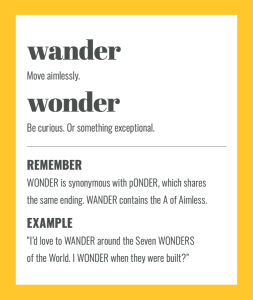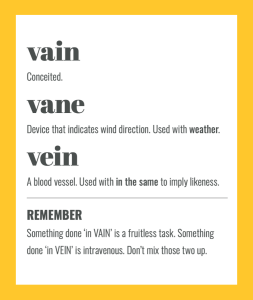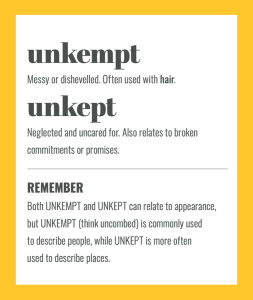ADVERSE vs AVERSE: simple spelling tips to remember the difference
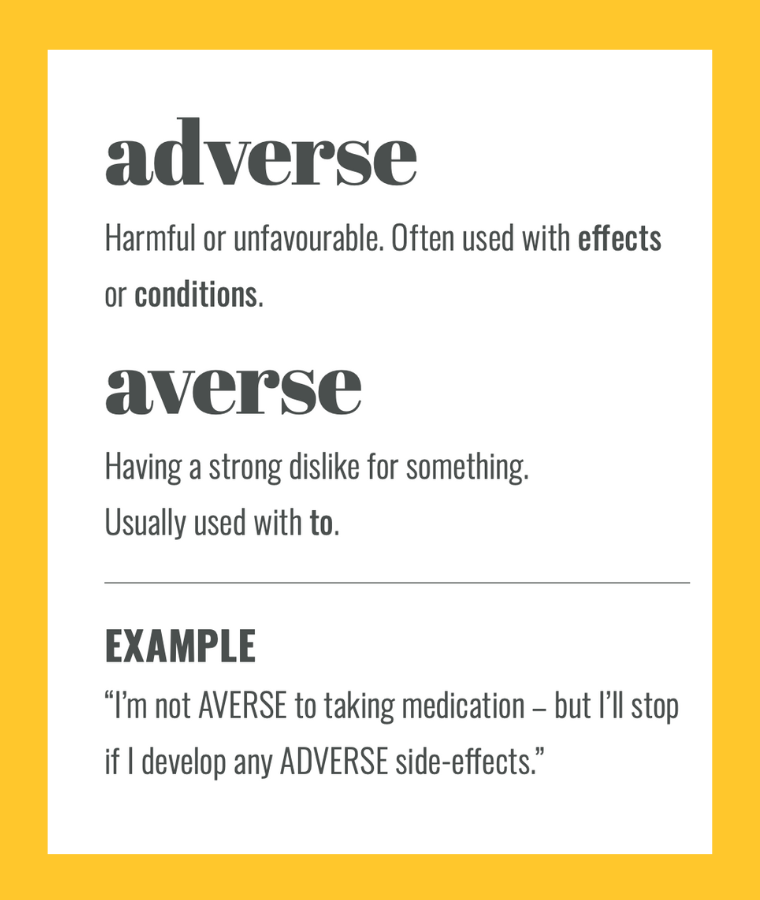
The words ADVERSE and AVERSE are easy to confuse because they look alike – but that doesn’t mean they can be used interchangeably! Read on to remember the difference between these two commonly confused words.
Here are my simple tips to remember the difference between ADVERSE and AVERSE.
When to use ADVERSE
ADVERSE is an adjective that means harmful or unfavourable. It’s often used with the word ‘effects’ or ‘conditions’.
You can use ADVERSE in a sentence like this:
“The prescribed medicine had an ADVERSE effect on the patient.”
OR
“The strike had an ADVERSE effect on production.”
When to use AVERSE
AVERSE is an adjective that describes the feeling of having a strong dislike for something.
It’s often used with the preposition ‘to’, like this:
“I became vegan because I’m AVERSE to eating meat.”
But it can also be used in a compound adjective, like this:“When it comes to investing my money, I’m fairly risk-AVERSE.”
This sentence shows the difference between ADVERSE and AVERSE in use:
“I’m not AVERSE to taking medication – but I’ll stop if I develop any ADVERSE side-effects.”
Get more tips in The Little Book of Confusables
Fun, memorable spelling tips for 600 commonly confused words, packed into 300+ gorgeous pages: just £11.95.
You’ll wonder how you managed without it!
GOLD award winner: 2023 eLit book awards/Distinguished Favorite: 2023 NYC Big Book Awards.

BREATH vs BREATHE vs BREADTH: simple spelling tips to remember the difference
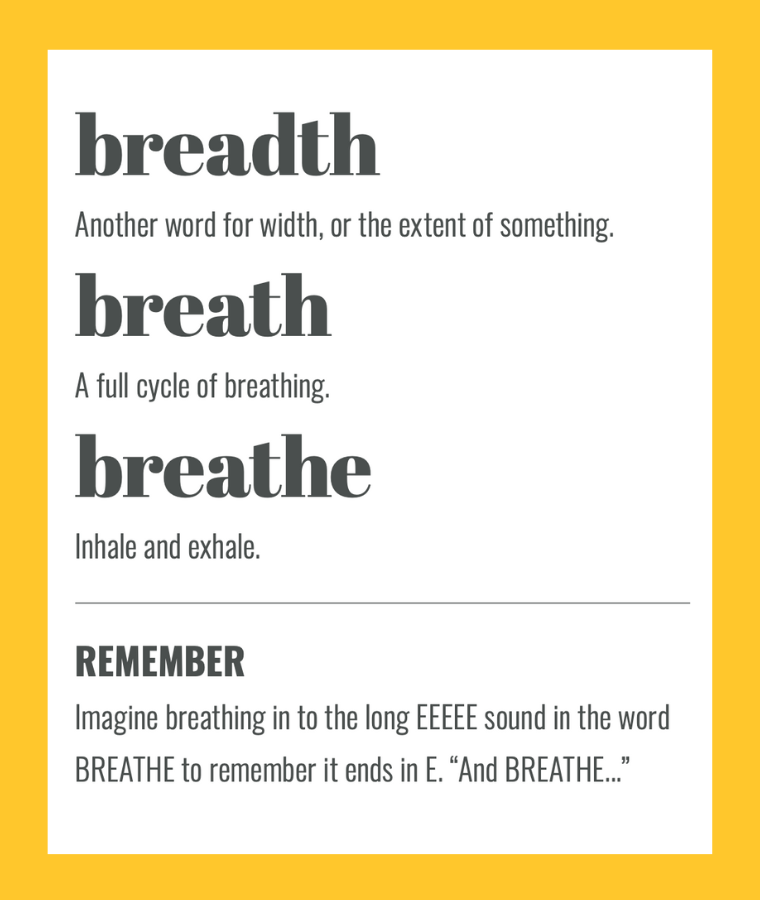
The words BREATH, BREATHE and BREADTH are easy to confuse because they look alike – yet their meanings are very different! Here’s how to remember the difference between these commonly confused words.
Here are my simple tips to remember the difference between BREATH, BREATHE and BREADTH.
When to use BREATH
BREATH is a noun that refers to the full cycle of breathing.
You can use BREATH in a sentence like this:
“Take a deep BREATH before you respond.”
OR
“I ran all the way home. I’m out of BREATH now!”
When to use BREATHE
BREATHE is a verb that describes the action of inhaling and exhaling air from the lungs.
You can use BREATHE in a sentence like this:
“Please BREATHE in deeply.”
OR
“And BREATHE…”
Here’s a simple tip to help you remember how to spell BREATHE:
Imagine breathing in to the long EEEEE sound in the word BREATHE to remember it ends in E.
When to use BREADTH
BREADTH is another word for width, or the extent of something.
You can use BREADTH in a sentence like this:
“Don’t underestimate the new lecturer. The BREADTH of his knowledge is incredible!”
OR
“The BREADTH of the boat made it hard to navigate the canal.”
I hope these tips help you remember the difference between BREATH, BREATHE and BREADTH in future!
Get more tips in The Little Book of Confusables
Fun, memorable spelling tips for 600 commonly confused words, packed into 300+ gorgeous pages: just £11.95.
You’ll wonder how you managed without it!
GOLD award winner: 2023 eLit book awards/Distinguished Favorite: 2023 NYC Big Book Awards.

Wander vs wonder: simple spelling tips to help you remember the difference
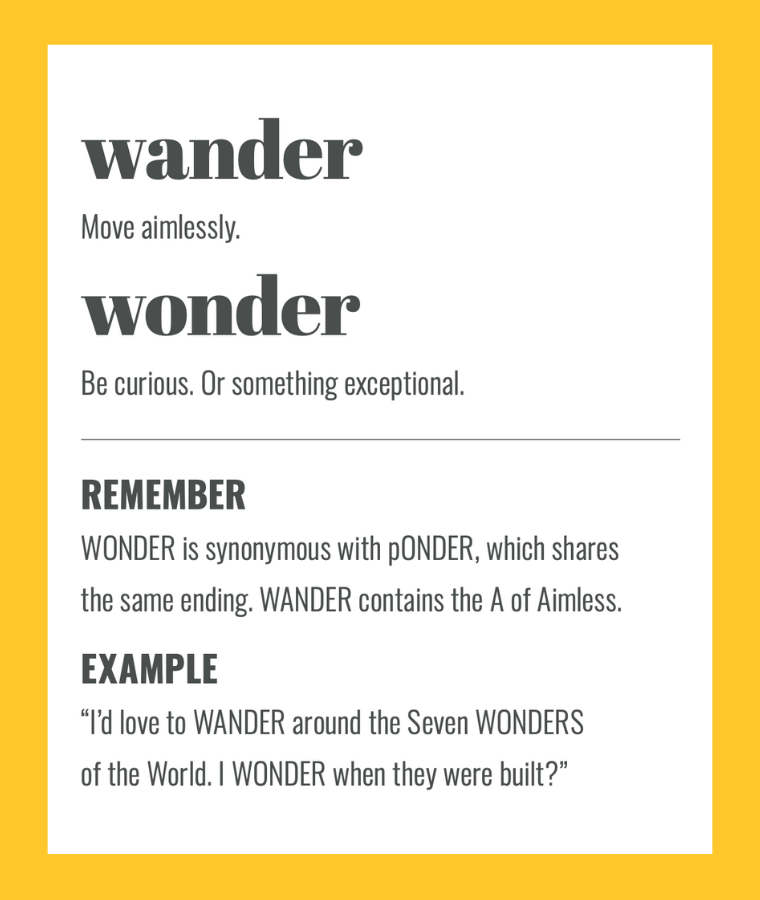
The words WANDER and WONDER are easy to confuse because they’re homophones. Despite the fact they sound the same, their meanings are very different!
Here’s my advice to help you remember the difference between WANDER and WONDER.
When to use WANDER
WANDER is a verb that describes the action of moving aimlessly.
It can be used in a sentence like this:
“We WANDERED around the town with no destination in mind.”
OR
The famous poem from William Wordsworth:
“I WANDERED lonely as a cloud”
When to use WONDER
WONDER can be a verb or a noun.
As a verb, WONDER describes the action of pondering or being curious.
It can be used like this:
“I WONDER what we’ll have for dinner.”
As a noun, WONDER describes something exceptional to be marvelled at, like the Seven Wonders of the Ancient World.
It can be used in a sentence like this:
“Her eyes were filled with WONDER at the beautiful view.”
Remember that WONDER is synonymous with pONDER, which shares the same ending – and that WANDER contains the A of Aimless.
I hope my tips help you remember the difference between WONDER and WANDER in the future!
Get more tips in The Little Book of Confusables
Fun, memorable spelling and usage tips for 600 commonly confused words, packed into 300+ gorgeous pages for just £11.95. You’ll wonder how you managed without it!
2023 GOLD award winner at the eLit book awards.
Vain vs vane vs vein: simple tips to remember the difference
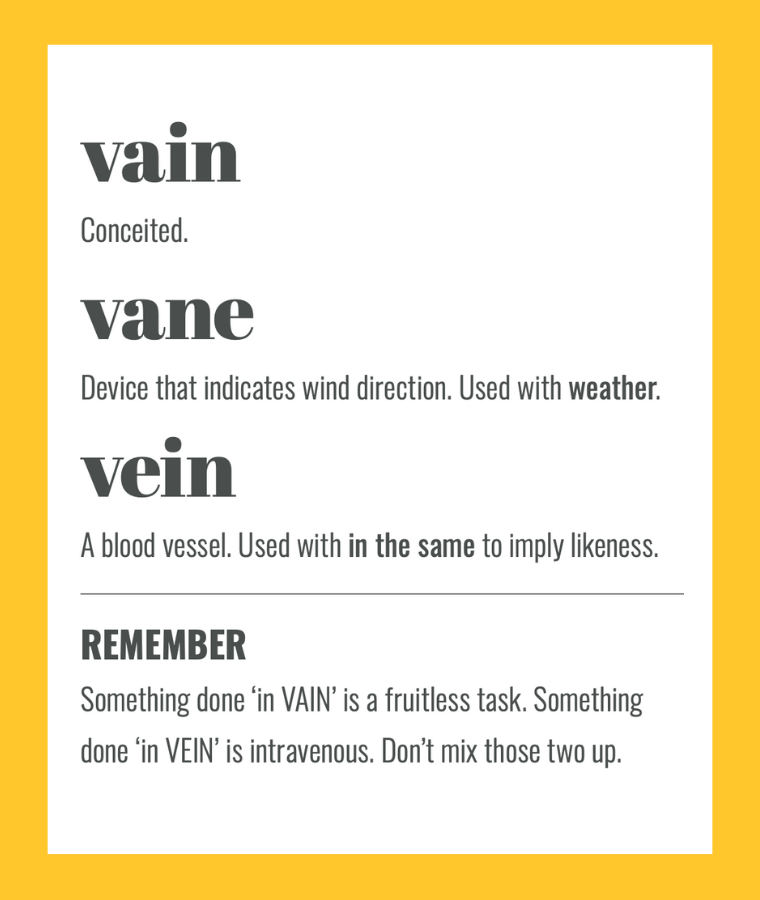
The words VAIN, VANE and VEIN are easy to confuse because they sound the same – they’re homophones – but their meanings are very different!
These simple spelling and usage tips will help you remember the difference between VAIN, VANE and VEIN.
When to use VAIN
VAIN is an adjective that describes someone who’s conceited – like the guy in the famous Carly Simon song, You’re So Vain.
VAIN can be used in a sentence like this:
“He was arrogant and VAIN.”
VAIN is also used in the phrase ‘in VAIN’, which describes a fruitless task.
(Don’t write ‘in VEIN’ unless you mean intravenous. There’s a big difference!)
When to use VANE
The word VANE usually proceeds ‘weather’.
A weather VANE is a device that indicates wind direction. You’ve probably seen them on the top of churches.
VANE can be used in a sentence like this:
“The class made their own weather VANES from paper and a straw.”
When to use VEIN
VEIN is a noun that describes a blood vessel.
It can be used in a sentence like this:
“I tried giving blood but they couldn’t find a VEIN!”
VEIN is also used in the phrase ‘in the same VEIN’, which implies likeness.
I hope these tips help you to remember the difference between these commonly confused words in the future.
Get more tips in The Little Book of Confusables
Fun, memorable spelling and usage tips for 600 commonly confused words, packed into 300+ gorgeous pages for just £11.95. You’ll wonder how you managed without it!
2023 GOLD award winner at the eLit book awards.
Unkempt vs unkept: easy ways to remember the difference
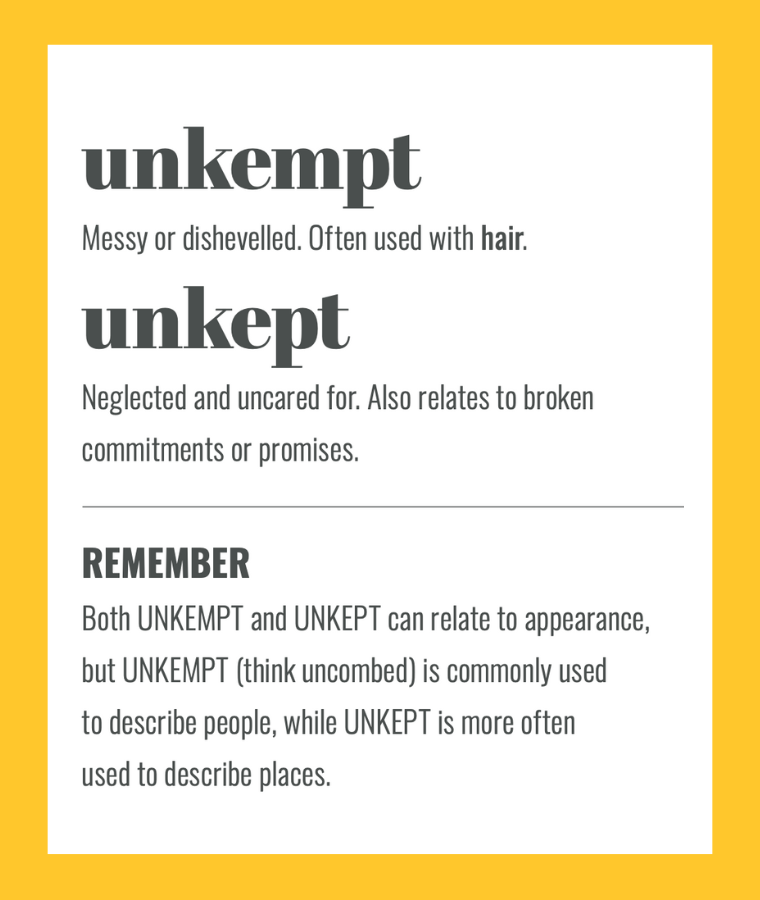
The words UNKEMPT and UNKEPT are easy to confuse because of their similarity. But there are important differences in their meanings, which you don’t want to get wrong!
Here are my simple tips to remember the difference between UNKEMPT and UNKEPT.
When to use UNKEMPT
UNKEMPT is an adjective that describes something messy or dishevelled. It’s often used to describe hair, or someone’s appearance.
It can be used in a sentence like this:
“He rolled out of bed, his hair UNKEMPT.”
When to use UNKEPT
UNKEPT is an adjective that describes something neglected and uncared for. It also relates to broken promises or commitments.
It can be used in a sentence like this:
“The garden used to be beautiful. Today it’s overgrown and UNKEPT.”
While UNKEMPT and UNKEPT can relate to appearance, UNKEMPT is commonly used to describe people, while UNKEPT is more often used to describe places.
To help you remember the difference, think of the M in UNKEMPT and uncoMbed – and the fact that both words sound similar.
Now you know the difference between UNKEMPT and UNKEPT. I hope these tips help you to remember the difference between these commonly confused words in the future.
Get more tips in The Little Book of Confusables
Fun, memorable spelling and usage tips for 600 commonly confused words, packed into 300+ gorgeous pages for just £11.95. You’ll wonder how you managed without it!
2023 GOLD award winner at the eLit book awards.


